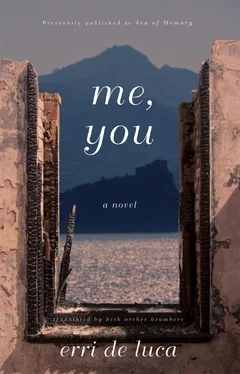“I’m Tateh? ”
“Yes.”
“Of course I’m Tateh . Tonight I am your father and you are my little Chaiele, and I know how to say your name the way he did, Chaiele.”
“You have to be Tateh . The teeth of a fish even engraved the Yiddish t of tateh on your hand.”
We went off arm in arm, she pulling me a little and I a little tipsy from the festival, from her, from the game between us that was going full sail. Her hand clutched mine where the moray had sunk its teeth. I felt tired and was afraid I was coming down with a fever that could rob me of the strength to get to the fire. I even saw one of the Germans who had been at the pizzeria but he wasn’t at all aware of us, and I felt the cork for the demijohn in my pocket, and no, I was not tired. Caia was leaning heavily on my arm, shifting her weight onto me so that she was light, and she moved her feet as though she were dancing, or marching, making me list to one side. And I took on her weight and shuffled along at her festival, those last hours before her departure, before losing sight of her forever. I suddenly had the impulse to pick her up and lift her onto my shoulders. From a merry-go-round came the refrain of a popular song: “I’ll never forget you, lovely Piedmontese girl, you’ll be the only star that shines for me.” And I was able to pick her up because she had become light and I heavy.

No one took notice of me the whole time I was in the crowd. A few people said hello to Caia. The mob was pressing and at times we came to a complete halt. That was when she took the opportunity to kiss me on the cheek; my skin puckered where she had placed her lips. I returned her kiss, placing mine on her hairline at the top of her forehead, and under my palms I felt the beat of her life pulsing in her temples. “Nu, nu,” the pulses of your blood beat under my hands, in this mob I am yours, but so much yours, Chaiele, that I will never be able to belong to anyone else.”
“You, mine,” she told me, and pulled me, saying, “Come!” because something attracted her elsewhere.
Near the merry-go-round Daniele was talking to two foreign girls and making them laugh. Caia had confetti all over her and had become a little girl. As for me, my head was spinning with thoughts like, I’ve waited so long, Chaiele, to take you to a festival, to wander around the stands, to hold you close. It seems to me that I’ve been yours since the beginning of time, nor is this our first time. Is that how it is for you too, to become aware at the apex of happiness that there was a before and that this is a repetition? But I didn’t say any of this, not wishing to disturb her childlike state, and wishing rather to follow her to her final pirouette of gaiety, until she fell into my arms fast asleep.

We were approaching the open stretch of the pier and the jetty of the isthmus that leads to the castle. A band was playing on a platform. On a pedestal stood the figure of a female saint. Pinned to her robe were bank notes and slips of paper with writing on them. Caia led me to the plaster saint covered with strips of paper as she was covered with confetti and said, looking at her, “Don’t I resemble her, Tateh? ”
“The way life resembles a mannequin. You are alive, Chaiele, you are alive in the midst of a festival, and this store dummy is a poor imitation of your beauty. You are alive, Chaiele, and for one evening so am I, close to your life.”
It was a solemn, resonant voice that came from a wooden throat, as from a guitar case. Even if I cleared my throat, it didn’t bring back my own voice.
“Yes, yes, Tatehle , I am alive, that’s why my name is Chaie, because it means life. It was you who gave it to me.”
I read the lines written on the white slips pinned to the statue’s robe. They were thanks for blessings received. One slip contained a line from the Bible: “Thus let all thine enemies perish, O Lord, but let those who love Him be as the rising sun in its might,” Judges, Deborah. All your enemies will perish, my Chaiele, they will perish in this way, I thought, touching the cork in my pocket. She also read the slip and asked me in a little girl’s voice, “And will you always love me?” distracting me from my thoughts about the fire and making me reply, “Like the rising sun in its might.” And she laughed again with her chipped tooth. I closed my eyes, overcome with fatigue, and leaned against her.
“Good-bye, Tateh. ”
When I heard her voice taking leave of me I roused myself and turned around, but Caia was still there holding my arm. Behind the statue I managed to get the frog out of my throat. My adolescent voice returned and my fatigue passed. I felt restored to myself, a relief mixed with emptiness. I was a boy again, light in years, once again uneasy about being with Caia, a name that means life, and until a moment ago I had known that, but at that moment I was surprised by it. I was surprised by everything. She had detached herself from her weight on my arm, from her childhood astride my shoulders. Caia was once again grown up, and the gratitude she had expressed earlier was now far away. The void on my arm informed me that I was once again myself.
We joined the others, who were already at the foot of the pier. They were eating watermelon and spitting the seeds at their feet. Daniele introduced the two German girls, who seemed nice and spoke a funny kind of English. Caia was very nice to them, speaking German and serving as interpreter for the rest of the evening. It was fascinating to watch her move from one language to the other, switching the sentences as they arrived and departed. I told her she was like a stationmaster and I would have liked to give her a whistle. She replied that trains had been her passion as a child and that she had made her father laugh when she told him she wanted to run a train. “Now you make languages travel,” I said.
“Yes, those of others.” A little naked doll peeked out of her pocket.
Daniele had his eye on one of the German girls and proposed going to see a movie at the open-air theater in the pine grove. On the island there were no closed movie theaters. It was unusual to opt for a movie, since there was always something better to do, but Daniele didn’t want to end the summer with yet another serenade on the beach. Caia was a remarkable interpreter. Her German was a birdsong. In her mouth it melted into crisp syllables where consonants collided. It became a language that could joke and warble. Caia’s voice managed to cleanse it in my ears. She knew how to handle wounds.
Daniele turned into a tour guide and showed the island to the two guests: stray dogs, oleanders, solemn turds left by the horses that drew the carriages, the bar that had the best gelati, pignoli to crack open and offer on the palm of the hand, taken by the fingers of the foreign girl who slowly selected the tiny nut from the center of the hand, thereby prolonging the contact for another second. The festival vanished in a buzz at our backs, and all together the group walked back up the road to the pine grove, untroubled by the impending good-byes. Daniele was a master at gags. Bursts of laughter rained down from the sky along with the flaming ribbons of the last clustered stars. The tallest pines left only a stripe of sky high up. We walked in the middle of the road to stay out in the open.

We came to the arena, as the opening between the trees was called, with its rows of folding wooden chairs and a screen that rippled in the wind, making waves on the faces of the actors. They were showing For Whom the Bell Tolls . Daniele sat next to his favorite. I did not find a seat next to Caia but in the row behind her. She turned around, gesturing for me to put my arms across the back of her seat. I did so and she laid her head on them and I watched the film in the most uncomfortable and most delicious position of my entire life. The smell of her hair heavy with the festive crowd and the noise, my fingers sticky with pine resin, the sky stretched out above, descending to the ground in a puff of warm breeze: it was air and scent to breathe in and never again exhale. I inhaled it, blocking out all other senses. I remember little of the film, the breathless beauty of a wartime love.
Читать дальше













